
Königsallee: Dusseldorf's Luxury Shopping Boulevard
Königsallee, affectionately known as Kö, is the crown jewel of Dusseldorf's shopping and fashion scene. This iconic boulevard, lined with lush trees and bordered by a serene canal, offers a unique blend of opulence and charm. Known for its high-end boutiques, designer stores, and luxury brands, Königsallee is a shopper's paradise. Here, you can find everything from the latest fashion trends to exquisite jewelry and stylish accessories. Beyond shopping, Königsallee is also a cultural and social hub. The boulevard boasts a variety of gourmet restaurants, chic cafes, and elegant bars, making it a perfect spot for both casual and fine dining. The beautiful canal that runs through the center adds to the area's allure, providing a picturesque setting for a leisurely stroll or a relaxing afternoon by the water. Königsallee is not just about luxury and glamour; it also offers a glimpse into Dusseldorf's rich history and vibrant arts scene. The boulevard is home to several art galleries and theaters, showcasing both contemporary and classical works. Whether you're a shopaholic, a foodie, or an art enthusiast, Königsallee has something to offer for every traveler.
Local tips in Königsallee
- Visit early in the morning to avoid the crowds and enjoy a peaceful stroll along the canal.
- Many shops close early on Sundays, so plan your shopping spree accordingly.
- Look out for seasonal events and festivals that often take place along the boulevard.
- For a unique experience, try dining at one of the canal-side restaurants during sunset.
Königsallee: Dusseldorf's Luxury Shopping Boulevard
Königsallee, affectionately known as Kö, is the crown jewel of Dusseldorf's shopping and fashion scene. This iconic boulevard, lined with lush trees and bordered by a serene canal, offers a unique blend of opulence and charm. Known for its high-end boutiques, designer stores, and luxury brands, Königsallee is a shopper's paradise. Here, you can find everything from the latest fashion trends to exquisite jewelry and stylish accessories. Beyond shopping, Königsallee is also a cultural and social hub. The boulevard boasts a variety of gourmet restaurants, chic cafes, and elegant bars, making it a perfect spot for both casual and fine dining. The beautiful canal that runs through the center adds to the area's allure, providing a picturesque setting for a leisurely stroll or a relaxing afternoon by the water. Königsallee is not just about luxury and glamour; it also offers a glimpse into Dusseldorf's rich history and vibrant arts scene. The boulevard is home to several art galleries and theaters, showcasing both contemporary and classical works. Whether you're a shopaholic, a foodie, or an art enthusiast, Königsallee has something to offer for every traveler.
Iconic landmarks you can’t miss
Kö-Bogen
Experience Düsseldorf's architectural masterpiece: Kö-Bogen, where innovative design meets luxury shopping and green spaces in the heart of the city, redefining urban living.
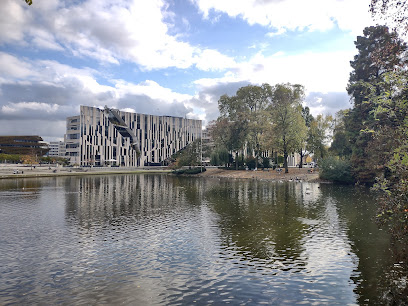
Königsallee
Experience Düsseldorf's Königsallee, a luxurious boulevard blending high-end shopping with historical charm, featuring flagship stores, a scenic canal, and a vibrant cultural scene.
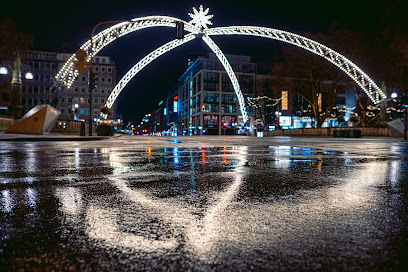
Tritonenbrunnen
Discover the Tritonenbrunnen on Düsseldorf's Königsallee: a historic fountain embodying the city's prosperity and artistic heritage, a must-see landmark for every visitor.
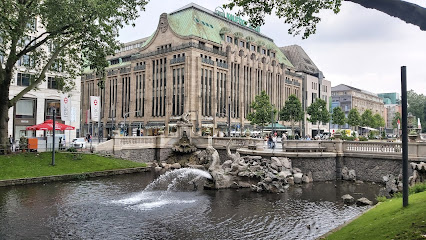
Bergischer Loewe (Monument)
Discover the Bergischer Löwe monument in Düsseldorf, a bronze symbol of the city's history and pride, located at the intersection of Königsallee and Graf-Adolf-Platz.
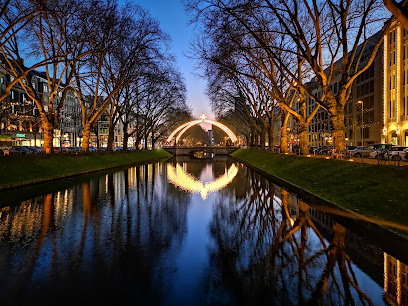
Bismarck Memorial
Discover the Bismarck Memorial in Düsseldorf: A bronze tribute to Otto von Bismarck, the Iron Chancellor, reflecting German history and unity on Martin-Luther-Platz.
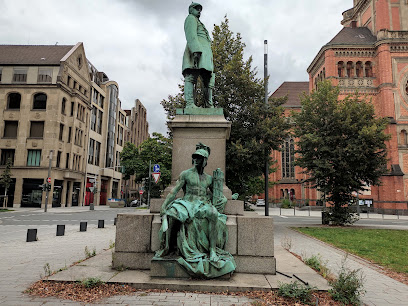
Stadtgraben / Königsallee
Experience Düsseldorf's premier boulevard: Königsallee, where luxury shopping meets scenic beauty and historical charm along the iconic Kö-Graben.
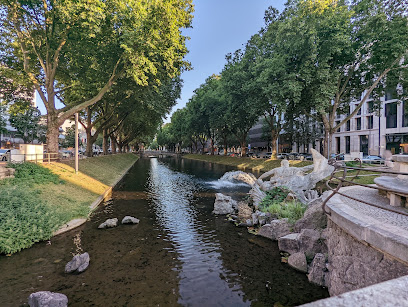
Schalenbrunnen auf dem Corneliusplatz
Discover the enchanting Schalenbrunnen on Düsseldorf's Königsallee: a neo-baroque masterpiece offering a tranquil escape and a glimpse into the city's rich history and vibrant culture.
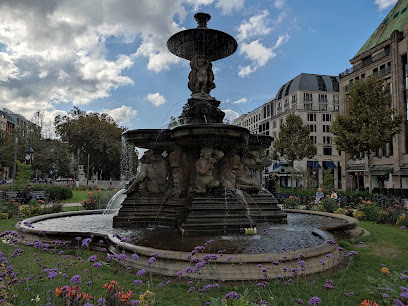
cornelius brunnen düsseldorf
Admire the neo-baroque Cornelius Brunnen, a historic fountain in Düsseldorf's heart, offering artistry and charm at the end of the luxurious Königsallee, near the tranquil Hofgarten.
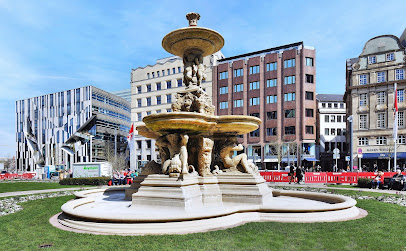
SCHMIED MIT KNABE
Discover Düsseldorf's Schmied mit Knabe: A poignant bronze sculpture with a rich history, offering a glimpse into the city's artistic heritage and resilience.
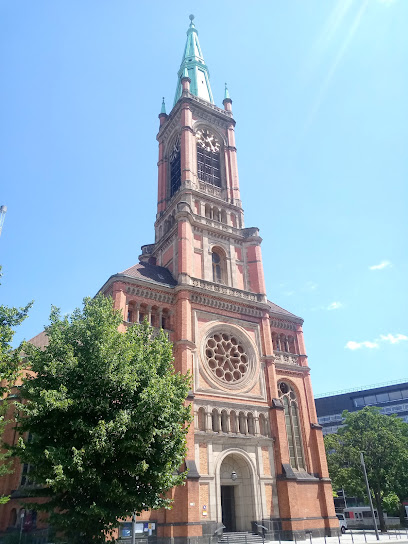
Düsseldorfs bekannteste Uhr
A timeless landmark on Düsseldorf's Königsallee, this iconic clock is a beloved meeting point and a symbol of the city's blend of luxury, history, and vibrant urban life.
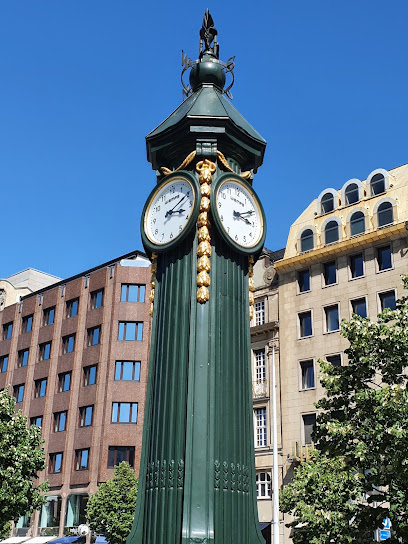
Unmissable attractions to see
Kö-Bogen
Explore Kö-Bogen, Düsseldorf's vibrant hub of luxury shopping, stunning architecture, and rich cultural experiences along the iconic Königsallee.
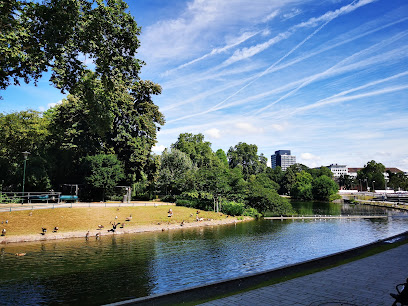
Königsallee
Explore Königsallee, Düsseldorf's luxurious shopping boulevard with stunning views, vibrant culture, and a delightful mix of fashion and dining experiences.
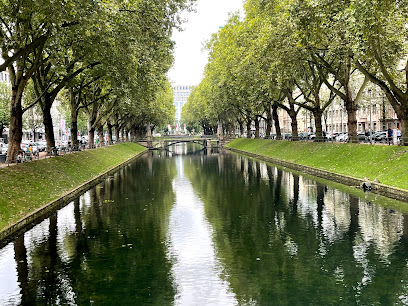
Tritonenbrunnen
Explore the stunning Tritonenbrunnen in Düsseldorf, an artistic fountain offering tranquility and beauty amidst the bustling Königsallee.
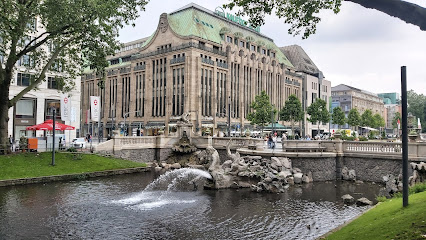
Kunsthalle Düsseldorf
Discover contemporary art at Kunsthalle Düsseldorf, an inspiring museum showcasing innovative exhibitions and vibrant cultural events.
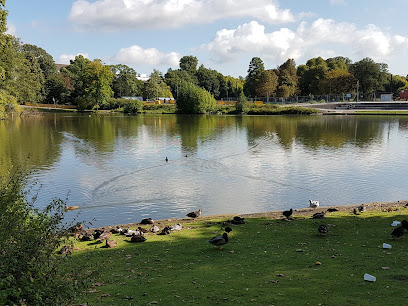
Stadterhebungsmonument
Explore the Stadterhebungsmonument in Düsseldorf, a stunning historical landmark that embodies the city's rich cultural heritage and vibrant atmosphere.
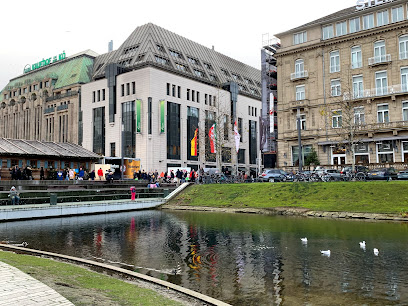
Bismarck Memorial
Explore the Bismarck Memorial in Düsseldorf, a historic tribute filled with cultural significance and surrounded by stunning gardens.
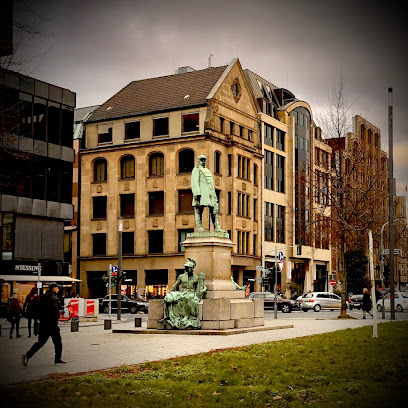
Stadtgraben / Königsallee
Explore the beauty of Stadtgraben and Königsallee in Düsseldorf, where lush landscapes meet upscale shopping and vibrant culture.
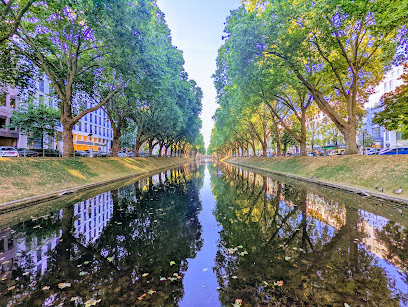
Düsseldorfs bekannteste Uhr
Explore Düsseldorf's iconic clock, a stunning landmark that captures the city's rich history and vibrant atmosphere in the heart of Germany.
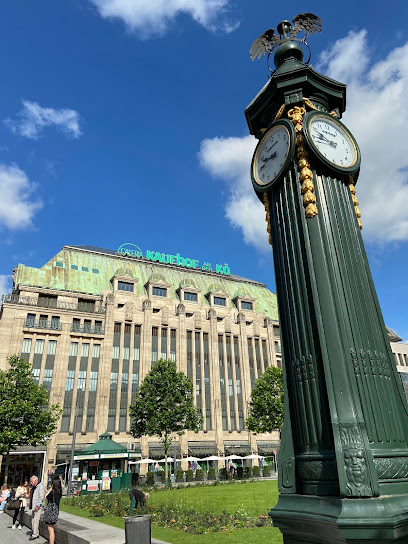
Nagel
Experience the essence of German cuisine at Nagel in Düsseldorf, where traditional flavors meet modern culinary artistry.
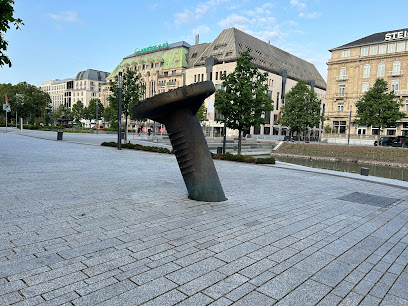
Essential places to dine
VAPIANO
Experience authentic Italian flavors at VAPIANO in Düsseldorf's vibrant Königsallee - fresh pasta, pizzas & more await you.
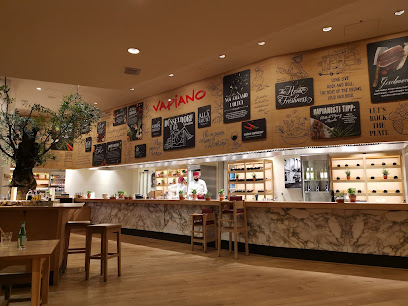
The Grill Upper Kö
Experience unparalleled steakhouse dining at The Grill Upper Kö – where culinary artistry meets luxurious ambiance in Düsseldorf.
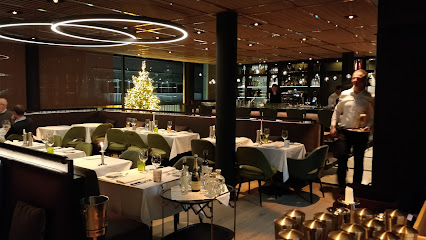
Ristorante Barolo
Experience authentic Italian cuisine at Ristorante Barolo in Düsseldorf - a culinary gem offering exquisite dishes in a charming setting.
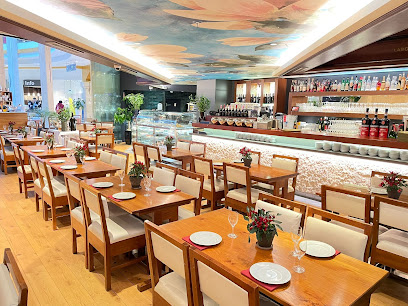
The Duchy - Düsseldorf
Experience exquisite modern European cuisine at The Duchy in Düsseldorf's luxurious Breidenbacher Hof.
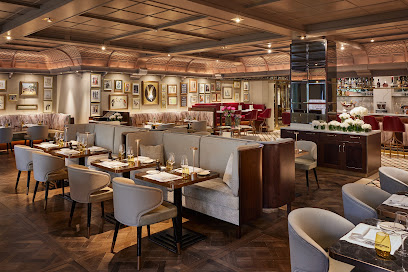
La Passione
Discover the taste of Italy at La Passione in Düsseldorf – where exquisite cuisine meets exceptional wine in an inviting atmosphere.
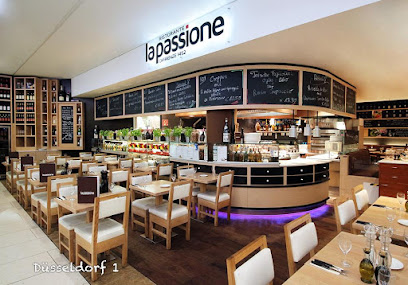
Restaurant Kö59
Experience culinary excellence at Restaurant Kö59 in Düsseldorf – where modern elegance meets exquisite flavors.
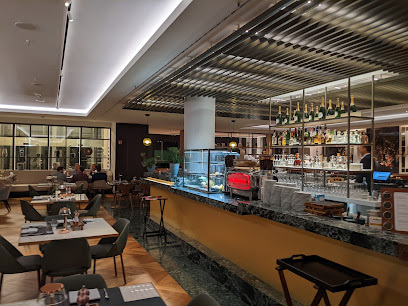
Le Petit Chef - Düsseldorf
Experience an extraordinary dining adventure at Le Petit Chef in Düsseldorf - where culinary art meets storytelling for an unforgettable meal.
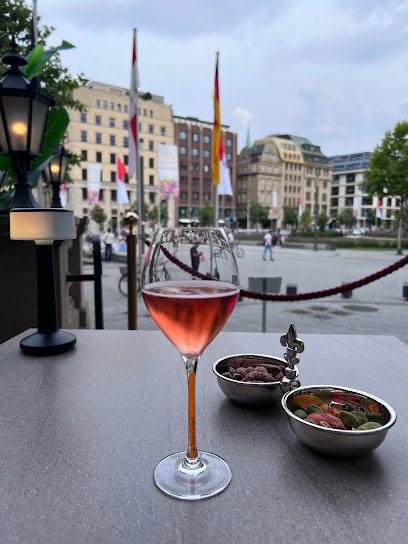
Restaurant Pink Pepper
Experience culinary excellence at Restaurant Pink Pepper in Düsseldorf - where contemporary dining meets exquisite flavors.
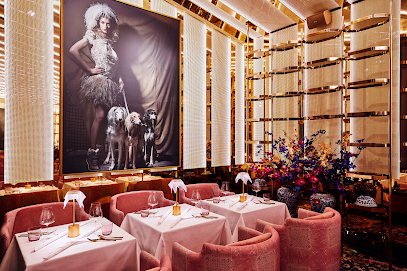
Jones
Experience exquisite dining at Jones Restaurant in Düsseldorf – where local flavors meet culinary artistry.
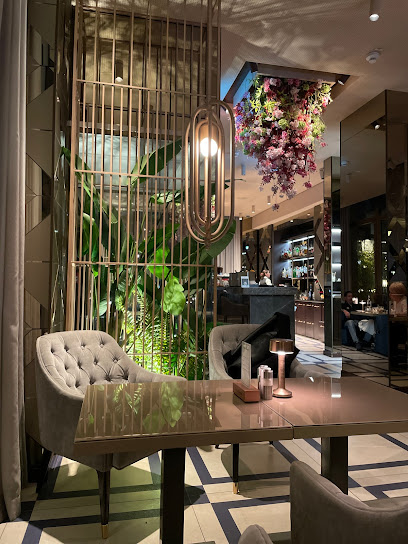
Ginos Restaurant & Bistro
Discover the perfect blend of Italian flavors and local charm at Ginos Restaurant & Bistro in Düsseldorf.
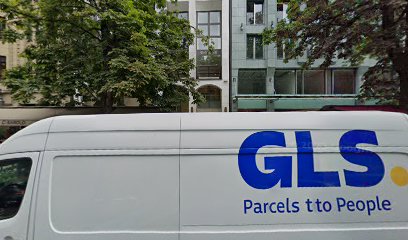
Markets, malls and hidden boutiques
GALERIA Düsseldorf Königsallee
Discover the ultimate shopping experience at GALERIA Düsseldorf Königsallee, where luxury meets everyday essentials in a chic atmosphere.
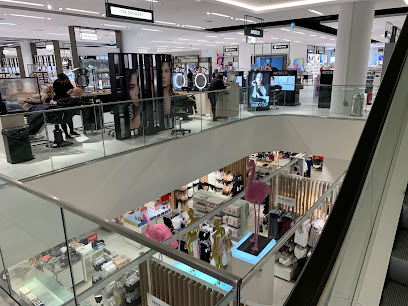
DIOR Düsseldorf Konigsallee
Discover the elegance and sophistication of DIOR Düsseldorf on the iconic Königsallee, a must-visit for fashion lovers.
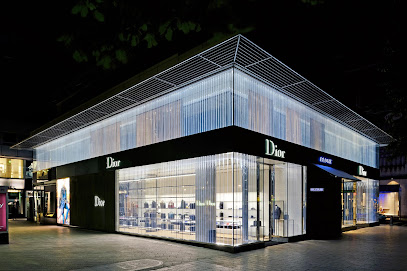
CHANEL BOUTIQUE DÜSSELDORF
Experience luxury shopping at CHANEL BOUTIQUE DÜSSELDORF, where timeless elegance meets contemporary fashion in the heart of the city.
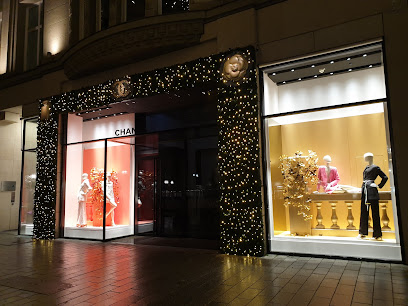
Prada Duesseldorf
Discover luxury fashion at Prada Düsseldorf, where elegance meets contemporary style in the heart of the city.
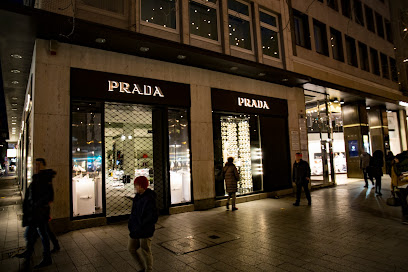
VERSACE
Discover luxury fashion at Versace in Düsseldorf, where style meets elegance with stunning apparel and accessories for every discerning shopper.
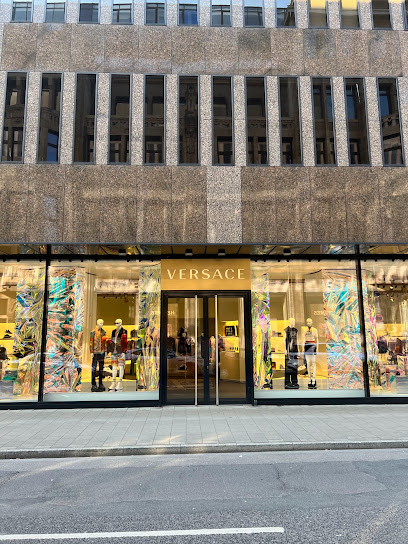
Montblanc
Explore the world of luxury craftsmanship at Montblanc in Düsseldorf, featuring exquisite jewelry, leather goods, and timeless writing instruments.
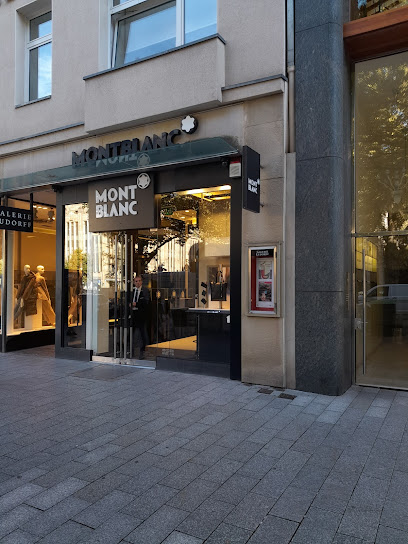
Unique Store
Explore the finest formal wear at Unique Store in Düsseldorf, where elegance meets modern fashion in a chic shopping experience.
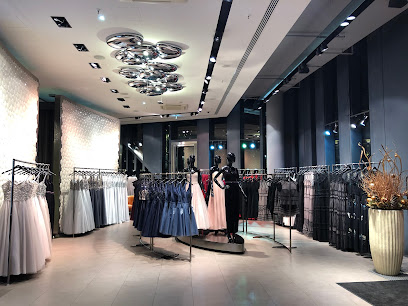
Truffleroom
Discover Truffleroom, Düsseldorf's chic women's clothing store on Königsallee, offering stylish apparel and personalized shopping experiences.
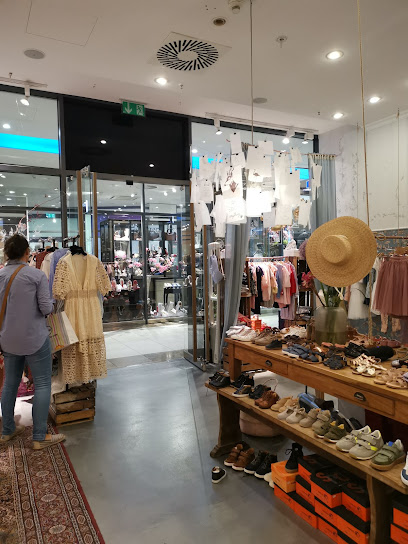
Wolford Düsseldorf
Explore Wolford Düsseldorf for luxurious women's clothing and elegant lingerie in a chic boutique setting on the renowned Königsallee.
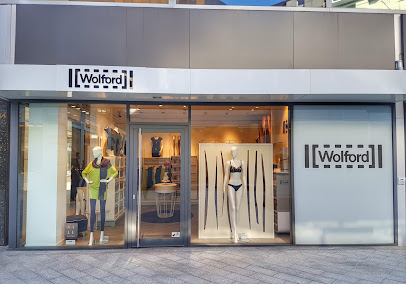
Jil Sander
Explore minimalist luxury at Jil Sander in Düsseldorf, where fashion meets timeless elegance through sophisticated clothing and accessories for discerning shoppers.
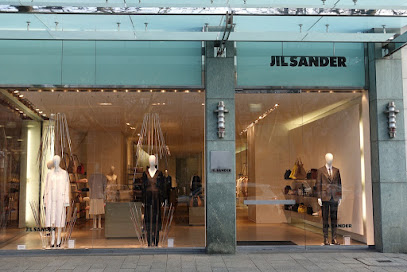
Essential bars & hidden hideouts
The Grill Upper Kö
Experience culinary excellence at The Grill Upper Kö, Düsseldorf's premier steakhouse and bar, where every meal is a celebration of flavor and sophistication.
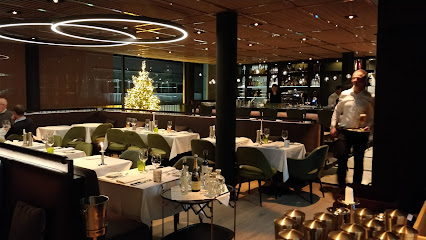
Tino's Bar - Düsseldorf
Discover Tino's Bar in Düsseldorf, where exquisite cocktails meet authentic Italian cuisine in a sophisticated atmosphere.
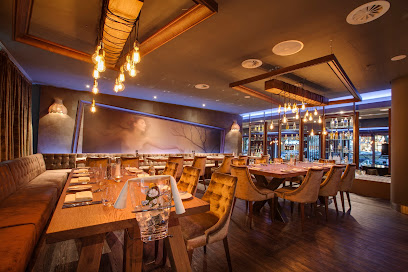
The Oak’s Bar - Düsseldorf
Experience Düsseldorf’s vibrant nightlife at The Oak’s Bar, a premier cocktail bar known for live music, exquisite cocktails, and a lively atmosphere.
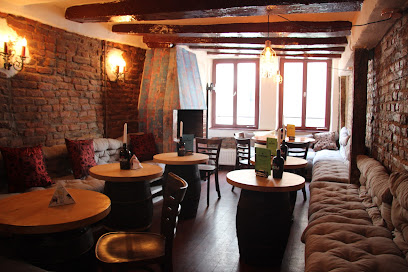
Bar Lola
Discover Bar Lola, Düsseldorf's lively bar known for innovative cocktails and a vibrant atmosphere, perfect for a memorable night out.
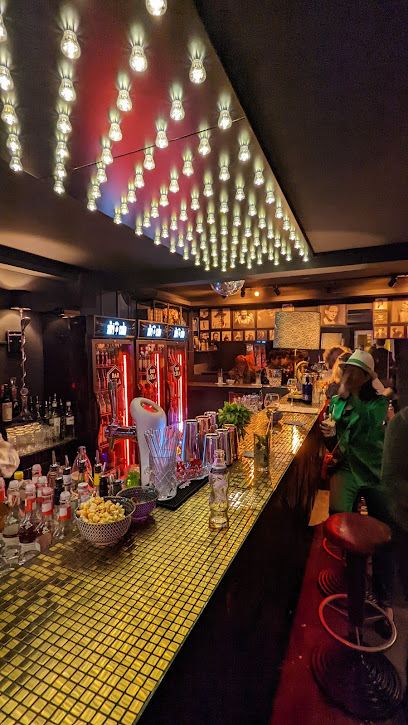
La Passione
Discover the exquisite flavors of Italy at La Passione, a charming restaurant and wine bar in Düsseldorf's vibrant Königsallee.
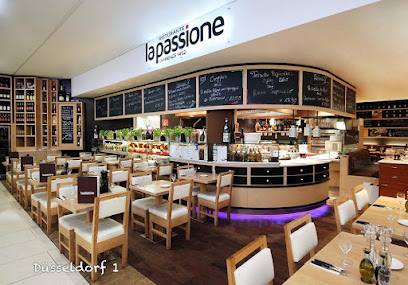
Bar & Smokers Lounge
Discover the elegance of Düsseldorf's Breidenbacher Hof Bar & Smokers Lounge, where exquisite cocktails and fine cigars await.
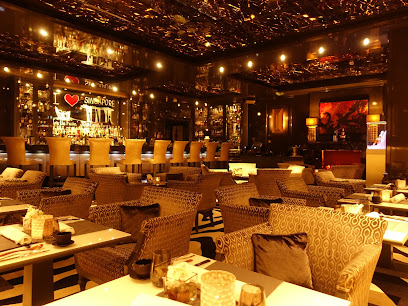
Eduard's by Breuninger Düsseldorf
Experience luxury and relaxation at Eduard's by Breuninger Düsseldorf, where exquisite drinks and a chic atmosphere await your visit.
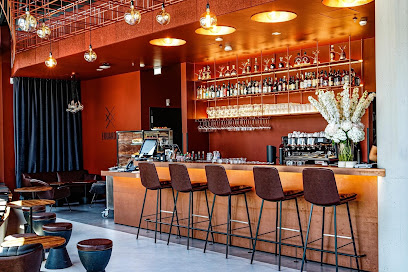
Bar Fifty Nine
Bar Fifty Nine: A Chic Cocktail Escape in Düsseldorf's Iconic Königsallee, Blending Style, Flavor, and Vibrant Nightlife.
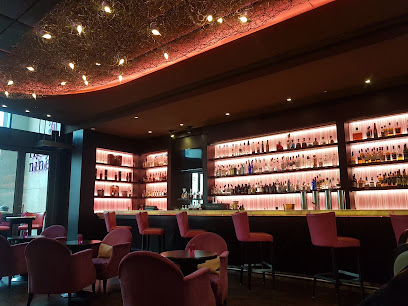
Füchschen Alm
Experience the heart of Düsseldorf's nightlife at Füchschen Alm, a cozy bar offering a warm atmosphere and delicious drinks.
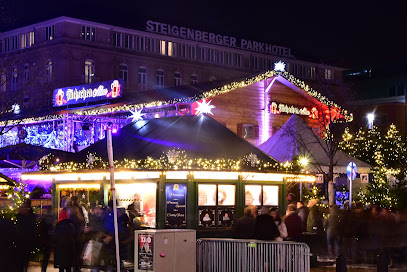
BarBarDO
Experience the vibrant nightlife of Düsseldorf at BarBarDO, where stylish ambiance meets an extensive drink selection.
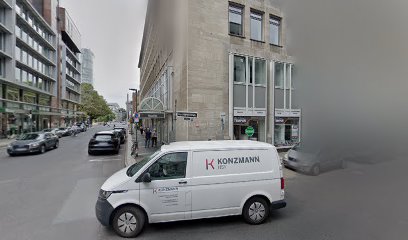
Local Phrases
-
- HelloHallo
[hah-loh] - GoodbyeAuf Wiedersehen
[owf vee-dur-zay-en] - YesJa
[yah] - NoNein
[nine] - Please/You're welcomeBitte
[bit-teh] - Thank youDanke
[dahn-keh] - Excuse me/SorryEntschuldigung
[ent-shool-dee-gung] - How are you?Wie geht es Ihnen?
[vee gayt es een-en] - Fine. And you?Gut. Und Ihnen?
[goote oont een-en] - Do you speak English?Sprechen Sie Englisch?
[shpre-khen zee eng-lish] - I don't understandIch verstehe nicht
[ikh fer-shtay-uh nikht]
- HelloHallo
-
- I'd like to see the menu, pleaseIch würde gerne die Speisekarte sehen, bitte
[ikh vur-deh geh-ren dee shpy-zuh-kar-teh zay-en, bit-teh] - I don't eat meatIch esse kein Fleisch
[ikh ess-uh kine flysh] - Cheers!Prost!
[prohst] - I would like to pay, pleaseIch möchte bitte bezahlen
[ikh mur-khte bit-teh beh-tsah-len]
- I'd like to see the menu, pleaseIch würde gerne die Speisekarte sehen, bitte
-
- Help!Hilfe!
[hil-feh] - Go away!Geh weg!
[geh vehg] - Call the Police!Rufen Sie die Polizei!
[roo-fen zee dee po-lee-tsai] - Call a doctor!Rufen Sie einen Arzt!
[roo-fen zee i-nen artsht] - I'm lostIch habe mich verloren
[ikh hahb mikh fer-loh-ren] - I'm illIch bin krank
[ikh been krahnk]
- Help!Hilfe!
-
- I'd like to buy...Ich möchte kaufen...
[ikh mur-khte kow-fen] - I'm just lookingIch schaue nur
[ikh shou-eh noor] - How much is it?Wie viel kostet das?
[vee feel koh-stet dahs] - That's too expensiveDas ist zu teuer
[dahs ist tsoh toi-er] - Can you lower the price?Können Sie den Preis senken?
[kern-en zee den price zehn-ken]
- I'd like to buy...Ich möchte kaufen...
-
- What time is it?Wie spät ist es?
[vee shpayt ist es] - It's one o'clockEs ist ein Uhr
[es ist iyn oor] - Half past (10)Halb zehn
[halb tsehn] - MorningMorgen
[mohr-gen] - AfternoonNachmittag
[nahk-mit-tahg] - EveningAbend
[ah-bent] - YesterdayGestern
[ges-tern] - TodayHeute
[hoy-teh] - TomorrowMorgen
[mohr-gen] - 1Eins
[ines] - 2Zwei
[tsvai] - 3Drei
[dry] - 4Vier
[feer] - 5Fünf
[foonf] - 6Sechs
[zeks] - 7Sieben
[zee-ben] - 8Acht
[ahkt] - 9Neun
[noyn] - 10Zehn
[tshehn]
- What time is it?Wie spät ist es?
-
- Where's a/the...?Wo ist ein/der...?
[vo ist iyn/dehr] - What's the address?Was ist die Adresse?
[vas ist dee ah-dreh-suh] - Can you show me (on the map)?Können Sie mir zeigen (auf der Karte)?
[kern-en zee meer tsay-gen (ouf dehr kar-teh)] - When's the next (bus)?Wann kommt der nächste (Bus)?
[vahn kohmt dehr ner-khs-teh (boos)] - A ticket (to ....)Eine Fahrkarte (nach ...)
[i-ne fahr-kaarte (nahk)]
- Where's a/the...?Wo ist ein/der...?
History of Königsallee
-
Königsallee, often referred to as the 'Kö', was conceived in the early 19th century as part of Düsseldorf's urban expansion under the direction of the Prussian government. Originally designed as a canal to facilitate transportation, it was transformed into a grand boulevard lined with trees and elegant shops, becoming a symbol of the city's prosperity.
-
Throughout the late 19th and early 20th centuries, Königsallee evolved into a fashion hub, attracting high-end boutiques and luxury brands. This period saw the establishment of renowned department stores and fashion houses, solidifying Düsseldorf's reputation as a center of commerce and style in Germany.
-
During the Weimar Republic in the 1920s, Königsallee became a lively cultural hotspot, hosting numerous art galleries, cafés, and theaters. The boulevard was frequented by artists and intellectuals, contributing to the vibrant cultural scene of Düsseldorf and marking it as an epicenter for avant-garde movements.
-
After World War II, Königsallee underwent significant reconstruction as Düsseldorf sought to rebuild and modernize. The area retained its status as a prestigious shopping destination, with the introduction of contemporary architectural designs that harmonized with its historical roots, including the development of luxury hotels and office spaces.
-
In the 21st century, Königsallee continues to thrive as one of Germany's most famous shopping streets, seamlessly blending tradition with modernity. The avenue is lined with designer boutiques, upscale restaurants, and cultural institutions, making it a focal point for both locals and tourists seeking a taste of Düsseldorf's rich history and contemporary lifestyle.
Königsallee Essentials
-
Königsallee, often referred to as 'Kö', is centrally located in Düsseldorf and easily accessible from other neighborhoods. If you're coming from Düsseldorf Airport, you can take the S-Bahn line S11 to Düsseldorf Hauptbahnhof (main train station), which takes about 15 minutes. From the main train station, it's a 10-15 minute walk to Königsallee. Alternatively, you can use the U-Bahn (subway) lines U78 and U79 to reach the nearby 'Steinstraße/Königsallee' station. Local buses also connect various neighborhoods to the area.
-
Königsallee is a pedestrian-friendly area, making it easy to explore on foot. Bicycles can be rented from various locations throughout the city, and there are designated bike lanes. Public transport is efficient, with trams and buses available. The Düsseldorf Stadtbahn has several stops close to Königsallee, including 'Steinstraße/Königsallee'. For longer distances, taxis and rideshare services are readily available.
-
Königsallee is generally safe for tourists, but standard precautions should be observed. Petty crime, such as pickpocketing, can occur, especially in crowded areas or during events. It is advisable to stay vigilant, particularly in less crowded streets or at night. Areas like the old town (Altstadt) can be lively at night, so be cautious after dark.
-
In case of an emergency, dial 112 for fire and medical assistance, or 110 for police. The nearest hospital is the Universitätsklinikum Düsseldorf, located a short distance away. It is advisable to keep emergency contact numbers handy and have travel insurance that covers emergencies. Pharmacies are also available along Königsallee for minor health issues.
-
Fashion: Do dress elegantly, as Königsallee is known for its luxury shopping and upscale environment. Don't wear overly casual attire when dining at fine restaurants. Religion: Do respect local customs, especially during visits to nearby religious sites. Public Transport: Do validate your ticket before boarding. Don't talk loudly or eat on public transport. Greetings: Do greet with a firm handshake. Don't use first names unless invited to do so. Eating & Drinking: Do try local specialties at cafés and restaurants. Don't engage in excessive drinking, as it may be frowned upon.
-
To experience Königsallee like a local, visit the nearby cafés and bakeries for coffee and traditional pastries. Explore the side streets for unique boutiques and art galleries that may not be found on the main thoroughfare. Attend local events, such as art exhibitions or markets, to mingle with residents. Don't miss the beautiful park along the canal, perfect for a leisurely stroll or a picnic, especially in spring and summer.
Nearby Cities to Königsallee
-
Things To Do in Essen
-
Things To Do in Cologne
-
Things To Do in Bonn
-
Things To Do in Aachen
-
Things To Do in Maastricht
-
Things To Do in Genk
-
Things To Do in Nijmegen
-
Things To Do in Eindhoven
-
Things To Do in Munster
-
Things To Do in Spa
-
Things To Do in Arnhem
-
Things To Do in Hasselt
-
Things To Do in Liege
-
Things To Do in Koblenz
-
Things To Do in Durbuy










